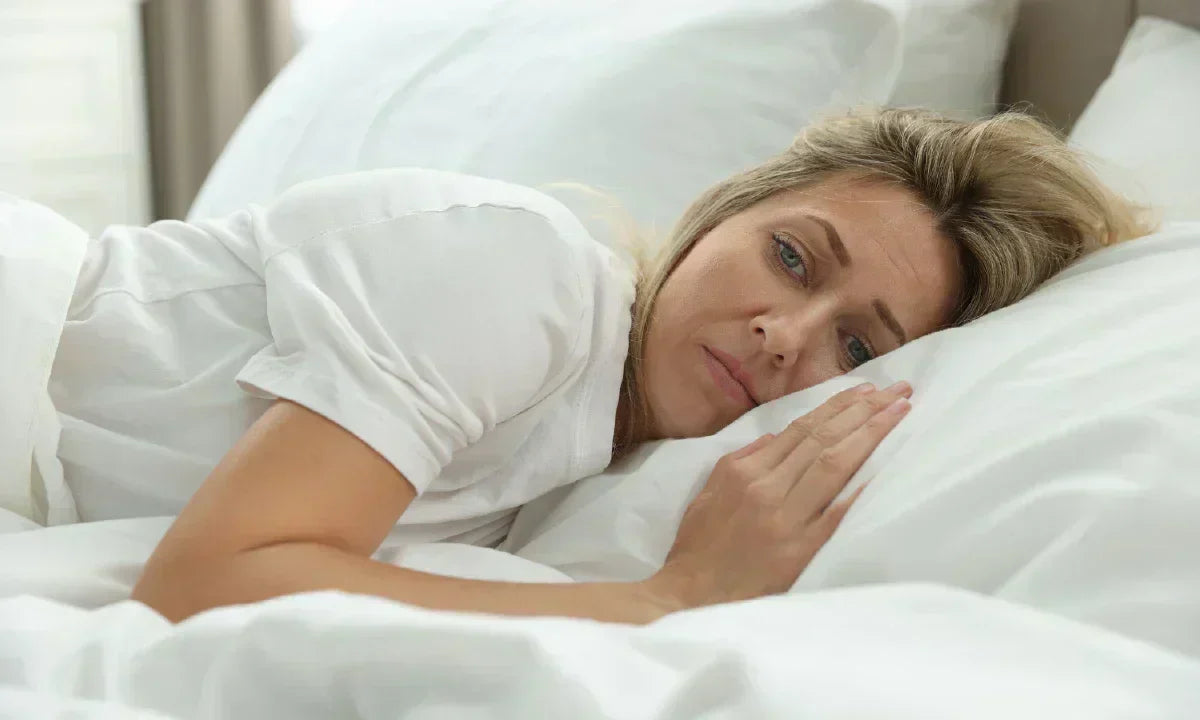Estimated Reading Time: 6 minutes
|Who wouldn’t want to sleep like a baby? Sound and restful sleep is what we all crave. Isn’t it? For many women, sound sleep seems like a faded dream when they hit perimenopause. In fact, the incidence of sleep disorders ranges from 16% to 47% during perimenopause and 35% to 60% after menopause, making sleepless nights a common struggle in this phase of life.
When a woman hasn’t had her menstrual period for 12 consecutive months, she is considered menopausal. However, menopause symptoms like sleeplessness often begin early, during the transitional period called ‘perimenopause’. Many women may experience this transitional phase in their mid-30s, and menopause usually occurs in the late 40s to early 50s.
While hormonal shifts during menopause are the major contributors, various other factors can also be blamed for your tossing and turning through the night. Fortunately, there are ways to improve sleep quality during this phase. Understanding the changes happening to you and how menopause affects sleep will help you get a good night’s sleep during this phase of your life.
During perimenopause, 16% to 47% of women experience sleep disorders; this increases to 35%–60% postmenopause.
How Does Menopause Affect Sleep?
Sleep disturbances related to menopause usually involve difficulty falling asleep, frequent night awakenings, and getting up early in the morning, which can also contribute to daytime fatigue.. All of this affects health, relationships, and productivity as well. There’s no denying that sleep disorders during menopause stem from hormonal changes, but this is just a piece of the puzzle.
Listed ahead are the 7 reasons explaining how menopause is affecting your sleep:
1. Hot Flashes & Night Sweats
Most women experience hot flashes and night sweats during menopause. Sleeplessness is often associated with hot flashes. These sudden and intense sensations of extreme heat can disrupt sleep by causing unexpected sleep awakenings. Hot flashes often affect the face, neck, and chest and can appear during the day or night. These episodes of intense heat typically last for 2-4 minutes and are, at times, accompanied by night sweats and anxiety. The discomfort caused by this makes it harder to fall asleep again.
The frequency of night sweats tends to increase as menopause progresses and can persist for years after the last period. Research suggests that hormonal changes like dips in the estrogen levels may trigger both hot flashes and awakenings. While not every hot flash directly causes sleep disruption, studies show a strong link between their severity and poor sleep quality.
What Causes Hot Flashes During Menopause?
Declining estrogen affects the hypothalamus, the brain's temperature control center, making it more sensitive to slight temperature changes. This leads to vasodilation (widening of blood vessels), triggering hot flashes and night sweats.
2. Hormones & Circadian Rhythm
Hormones that follow the body’s natural rhythm (circadian rhythm) control the sleep cycle. The rhythm also controls many other aspects of physiology, such as bowel movements, body temperature, and blood pressure. The sleep hormone melatonin helps regulate sleep by making us drowsy at night and alert in the morning.
Estrogen and progesterone influence the production of melatonin. As hormones change, circadian rhythm regulation may be affected, leading to early awakenings and reduced deep sleep. Your body struggles to maintain a consistent sleep cycle.
3. Restless Legs Syndrome
Restless legs syndrome (RLS) is common during menopause. This condition causes uncomfortable sensations in the legs when lying down and an irresistible urge to move them. The movement provides only temporary relief and makes it difficult to sleep, leading to insomnia.
Estrogen influences dopamine, a neurotransmitter that controls movement. Hormonal changes may disrupt dopamine signaling, leading to tingling, discomfort, and an urge to move the legs at night. The decline in iron levels during menopause also has a role to play in this.
4. Snoring and Sleep Apnea
Snoring and sleep apnea become more common after menopause due to hormonal changes. Sleep apnea is a condition where a person briefly stops breathing while sleeping, which happens because the airway gets blocked or the brain doesn’t send the right signals to breathe.
Estrogen and progesterone support muscle tone in the airway. The decline in these hormones can make the throat muscles weaker, which can cause the airway to collapse easily during sleep. Weight gain, which is also common in menopause, can add to this problem. Sleep apnea increases the risk of obstructive sleep apnea (OSA) and loud snoring, leading to poor sleep quality.
5. Mental Health & Mood Shifts
Estrogen has antidepressant and neuroprotective effects. It helps regulate cortisol (a stress hormone) and promotes serotonin and dopamine, which are essential for mood stability. Fluctuating estrogen levels during menopause can disrupt neurotransmitters that are responsible for mood regulation, which can lead to mood swings, anxiety, and depression. Racing thoughts and emotional distress can negatively affect sleep quality. Conversely, poor sleep can exacerbate mood issues, thereby creating a cycle where each condition worsens the other.
6. Urinary problems
Aging and declining estrogen levels during perimenopause can weaken the bladder muscles, urethra, and pelvic floor, leading to frequent urination, urgency, and incontinence. As a result, many women find themselves waking up multiple times throughout the night to use the bathroom, which significantly disrupts their sleep. These urinary issues can also have an impact on overall well-being, affecting mood, energy levels, and daily functioning.
7. Insomnia
Estrogen and progesterone levels help regulate the sleep-wake cycle. Estrogen influences serotonin and GABA (Gamma-AMinobutyric Acid), neurotransmitters that promote relaxation. As menopause results in a drop in these hormone levels, the brain struggles to maintain deep, restful sleep, leading to insomnia.
GABA (Gamma-Aminobutyric Acid) is a neurotransmitter in the brain that helps calm the nervous system. It works by reducing brain activity, promoting relaxation, reducing stress, and supporting sleep.
What You Can Do To Improve Sleep Quality During Menopause?
-
Keep Cool at Night: Hot flashes can wake you up. Use breathable bedding and keep your bedroom cool. A fan or cooling pillow may help.
-
Avoid Common Triggers: Avoid spicy foods, caffeine, and alcohol in the evening. They can trigger hot flashes and disrupt sleep.
-
Create a Calming Routine: Go to bed and wake up at the same time every day. Wind down with gentle stretches, journaling, or meditation. Avoid screens before bed.
-
Practice Deep Breathing: To relax, practice deep breathing, meditation, or gentle exercise. You may also want to practice journaling and gratitude.
-
Sleep Position & Weight: Sleeping on your side and maintaining a healthy weight can help reduce snoring and sleep apnea.
-
Limit Alcohol and Sedatives: They may seem relaxing but often disrupt deep sleep and worsen breathing issues.
-
Ease Restless Legs: Stretch before bedtime and check iron and magnesium levels to relieve restless leg syndrome.
-
Manage Nighttime Bathroom Trips: Limit fluids before bedtime and do pelvic floor exercises for bladder control to reduce nighttime trips to the bathroom.
-
Reset Your Body Clock: Get morning sunlight and limit blue light at night. Avoid long daytime naps to sleep better at night.
The Takeaway
Menopause may bring significant changes to your sleep quality. But it doesn’t mean restful nights are out of reach now. From hot flashes to insomnia, multiple factors can disrupt sleep quality as you go through this natural phase of life. However, understanding these changes is the first step toward managing them. By incorporating healthy sleep habits, making lifestyle adjustments, and seeking medical guidance when needed, you can improve your sleep and overall well-being.
At Wellness Extract, we believe in empowering women with science-backed solutions for better health during every life stage. If sleep disturbances persist, consulting a healthcare professional can help you decide what works best for you. Because quality sleep isn’t just a luxury; it’s a necessity for a healthier, happier you.
References
-
Kravitz, Howard M., and Hadine Joffe. "Sleep during the perimenopause: a SWAN story." Obstetrics and gynecology clinics of North America 38.3 (2011): 567. https://pmc.ncbi.nlm.nih.gov/articles/PMC3185248/
-
Seeman, Mary V. "Why are women prone to restless legs syndrome?." International journal of environmental research and public health 17.1 (2020): 368. https://pubmed.ncbi.nlm.nih.gov/31935805/
-
Tandon, Vishal R., et al. "Menopause and sleep disorders." Journal of mid-life health 13.1 (2022): 26-33. https://pmc.ncbi.nlm.nih.gov/articles/PMC9190958/
-
Salari, Nader, et al. "Global prevalence of sleep disorders during menopause: a meta-analysis." Sleep and Breathing 27.5 (2023): 1883-1897. https://pmc.ncbi.nlm.nih.gov/articles/PMC9996569/
-
Shi, Xiaomin, et al. "Knowledge, attitude, and practice toward sleep disorders and sleep hygiene among perimenopausal women." Scientific Reports 14.1 (2024): 11663. https://www.nature.com/articles/s41598-024-62502-4






































